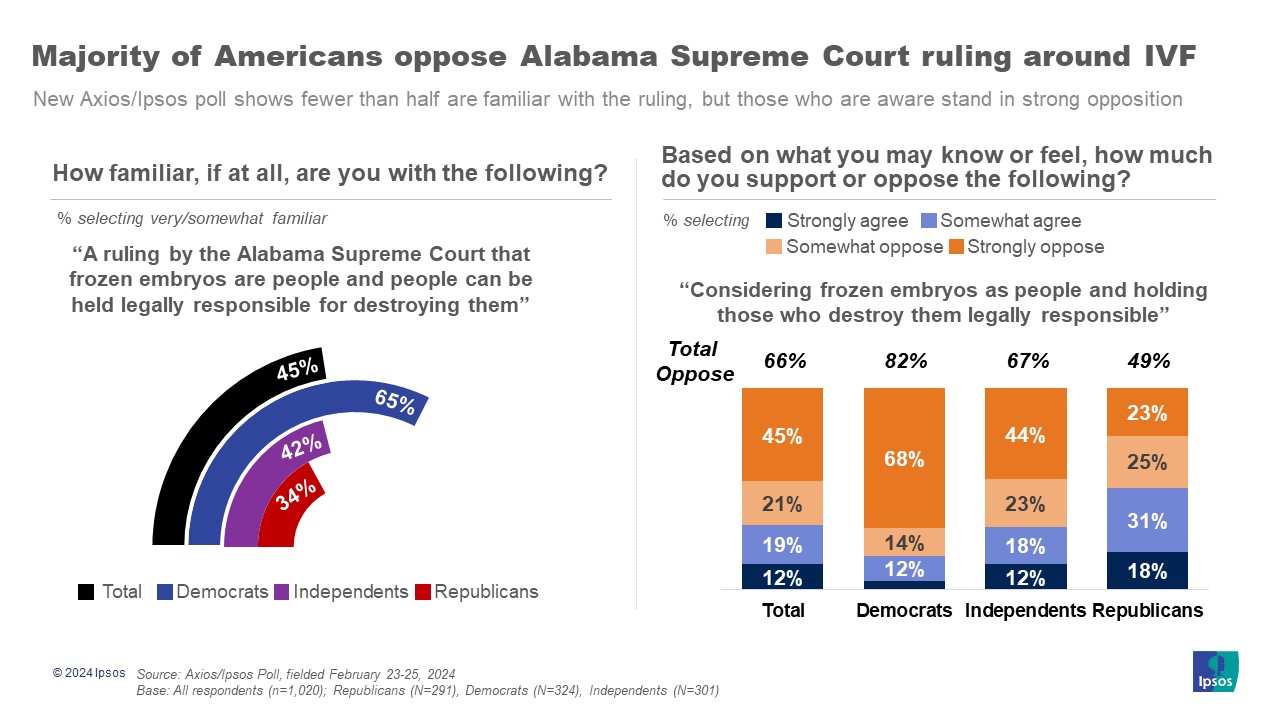Majority of Americans oppose Alabama Supreme Court ruling around IVF
Washington, DC, February 28, 2024 — Two-thirds of Americans oppose the Alabama Supreme Court ruling that frozen embryos created through in vitro fertilization (IVF) are considered children and people can be held legally responsible for destroying them, according to an Axios/Ipsos poll fielded a week after the ruling. However, fewer than half of Americans are familiar with the ruling itself. There is a significant partisan gap on familiarity with a range of issues around abortion and reproductive health tested in the survey, with a majority of Democrats familiar with these events, compared to roughly a quarter to a third of Republicans. As such, opposition is even higher among Americans who are familiar with the ruling.
For more information about this study, please click here.

Key Findings:
1. Although a minority of Americans are familiar with the Alabama ruling that impacts IVF, the majority stand in opposition.
- Overall, 45% are familiar (including 22% who are very familiar and 23% who are somewhat familiar), while a 54% majority have either heard of it, but that’s it, or never heard of it.
- A majority of Democrats (65%), college-educated Americans (62%), those age 65 and over (60%), high-income Americans (56%), and those who have had, or know someone who had, an abortion (54%) are familiar with the ruling.
- Among those who oppose considering frozen embryos as people and holding those who destroy them legally responsible, most strongly oppose rather than somewhat oppose (45% strongly vs. 21% somewhat). Two in three Democrats (68%) strongly oppose, but so do 44% of independents and roughly a quarter (23%) of Republicans.
- Republicans are evenly split, 49% support and 49% oppose. On a separate measure, your state banning emergency contraceptives (also known as Plan B), the majority of Republicans, 62%, oppose, alongside 79% of independents and 92% of Democrats.
2. When it comes to recent developments around abortion and reproductive healthcare, there is a partisan knowledge gap. Democrats are significantly more tuned in.
- Across the board, fewer than half of Americans are at least somewhat familiar with the Alabama ruling, a reported push for a nationwide ban on abortion at 16 weeks of pregnancy, and some states considering bans on emergency contraceptives. In addition, a quarter (27%) are familiar with Nex Benedict, a non-binary teen in Oklahoma, dying following an alleged beating in their school bathroom.
- In each instance, there is a significant partisan gap on familiarity. On the measures around abortion, contraception, and IVF, 53% or more of Democrats are familiar, compared to 24-34% of Republicans and 34-42% of independents. Under half of Democrats (44%) are familiar with Benedict’s death, but that still represents a 30-percentage point gap with Republicans (14%).
3. Roughly half of American adults have had or personally know someone who has had an abortion. One in three know have used or personally know someone who used IVF to try and conceive a baby.
- Overall, 48% of Americans have had or personally know someone who has had an abortion. This includes 17% of women who report having one themselves.
- Among these people who have, or know someone who, had an abortion, those who earn $100k+ are more likely than those who earn under $50k to say the person who got the abortion did not have to cross state lines to do so (93% vs. 83%, respectively).
- Among these people who have, or know someone who, had an abortion, 71% oppose considering frozen embryos as people, slightly higher than the national average.
- Thirty-five percent of Americans also report having used IVF or knowing someone who has used IVF to try and conceive. This includes half of Americans with a college degree and nearly half with an income of $100,000 or more (46%).
About the Study
This Axios/Ipsos poll was conducted February 23-25, 2024, by Ipsos using the probability-based KnowledgePanel®. This poll is based on a nationally representative probability sample of 1,020 adults age 18 or older. The sample includes 291 Republicans, 324 Democrats, and 301 independents.
The survey was conducted using KnowledgePanel, the largest and most well-established online probability-based panel that is representative of the adult U.S. population. Our recruitment process employs a scientifically developed addressed-based sampling methodology using the latest Delivery Sequence File of the USPS – a database with full coverage of all delivery points in the U.S. Households invited to join the panel are randomly selected from all available households in the U.S. Persons in the sampled households are invited to join and participate in the panel. Those selected who do not already have internet access are provided a tablet and internet connection at no cost to the panel member. Those who join the panel and who are selected to participate in a survey are sent a unique password-protected log-in used to complete surveys online. As a result of our recruitment and sampling methodologies, samples from KnowledgePanel cover all households regardless of their phone or internet status and findings can be reported with a margin of sampling error and projected to the general population. KnowledgePanel members receive a per survey incentive, usually the equivalent of $1 (though for some it is $2) in points, that can be redeemed for cash or prizes. No prenotification email for this study was sent prior to field. Panelists receive a unique login to the survey and are only able to complete it one time. One reminder email was sent for this study.
The data for the total sample were weighted to adjust for gender by age, race/ethnicity, education, Census region, metropolitan status, and household income. Party ID benchmarks are from recent multi-night ABC News polls. The demographic benchmarks came from the 2023 March Supplement of the Current Population Survey (CPS).
- Gender (Male, Female) by Age (18–29, 30–44, 45-59 and 60+)
- Race/Hispanic Ethnicity (White Non-Hispanic, Black Non-Hispanic, Other, Non-Hispanic, Hispanic, 2+ Races, Non-Hispanic)
- Education (Less than High School, High School, Some College, Bachelor or higher)
- Census Region (Northeast, Midwest, South, West)
- Metropolitan status (Metro, non-Metro)
- Household Income (Under $25,000, $25,000-$49,999, $50,000-$74,999, $75,000-$99,999, $100,000-$149,999, $150,000+)
- Party ID (Democrat, Republican, Independent, Something else)
The margin of sampling error is plus or minus 3.3 percentage points at the 95% confidence level, for results based on the entire sample of adults. The margin of sampling error takes into account the design effect, which was 1.17. For Republicans, the margin of sampling error is plus or minus 6.0 percentage points at the 95% confidence level. The design effect for Republicans is 1.10. For Democrats, the margin of sampling error is plus or 5.8 percentage points at the 95% confidence level. The design effect for Democrats is 1.12. For independents, the margin of sampling error is plus or minus 5.9 percentage points at the 95% confidence level. The design effect for independents is 1.09. The margin of sampling error is higher and varies for results based on sub-samples. Sampling error is only one potential source of error. There may be other unmeasured non-sampling error in this or any poll. In our reporting of the findings, percentage points are rounded off to the nearest whole number. As a result, percentages in a given table column may total slightly higher or lower than 100%. In questions that permit multiple responses, columns may total substantially more than 100%, depending on the number of different responses offered by each respondent.
For more information on this news release, please contact:
Mallory Newall
Vice President, US
Public Affairs
+1 202 374-2613
[email protected]
About Ipsos
Ipsos is one of the largest market research and polling companies globally, operating in 90 markets and employing over 18,000 people.
Our passionately curious research professionals, analysts and scientists have built unique multi-specialist capabilities that provide true understanding and powerful insights into the actions, opinions and motivations of citizens, consumers, patients, customers or employees. We serve more than 5000 clients across the world with 75 business solutions.
Founded in France in 1975, Ipsos is listed on the Euronext Paris since July 1st, 1999. The company is part of the SBF 120 and the Mid-60 index and is eligible for the Deferred Settlement Service (SRD).
ISIN code FR0000073298, Reuters ISOS.PA, Bloomberg IPS:FP www.ipsos.com



